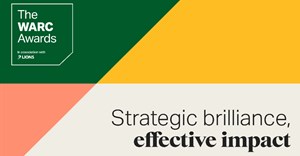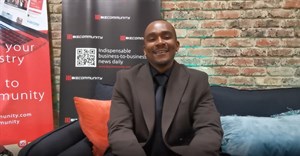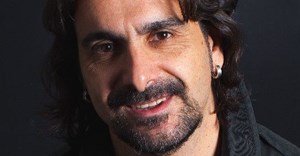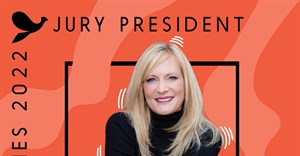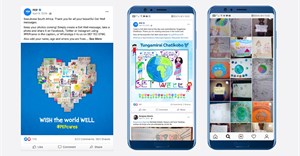Trending
 5 key moments that are solidifying Tyla's brandKarabo Ledwaba
5 key moments that are solidifying Tyla's brandKarabo Ledwaba

 George building collapse: 44 remain missingKatja Hamilton
George building collapse: 44 remain missingKatja Hamilton
 Unpaid school uniform makers occupy Gauteng social development officesMasego Mafata, Daniel Steyn and Raymond Joseph
Unpaid school uniform makers occupy Gauteng social development officesMasego Mafata, Daniel Steyn and Raymond Joseph
Xenopoulos spots contradictions at Cannes
Xenopoulos introduced his theme with the following: “There were contradictions between the creativity and idealism of the festival and the harsh reality of the real world; between the cutting-edge tech designed to enhance our connectivity and elevate us out of the world of poverty, hunger and disease, which contrasted against the fact that we are facing some of the biggest humanitarian crises of the modern age. But in amongst those contradictions, I think that one will also find the kernels of truth that will help to reconcile those contradictions and move towards a better world.”

Xenopoulos also talked about the fact that for years, Cannes has served as a celebration of creative work as well as one massive party, but this year things were different. “I’ve seen a real shift from the party culture to a learning culture and that’s because the industry is changing so fast with new technologies coming on board, new media channels being invented and new ways of communicating and innovating every day that unless you stay abreast of what is happening, you’re going to fall dangerously behind.”
Kevin Kelly’s four mega trends for 2016
Xenopolous quoted many speakers from Cannes, but focused predominantly on the insights shared by Kevin Kelly, founder of Wired magazine.
Virtual reality (VR)
Kelly’s first mega trend was virtual reality and how it will change the world as we know it. Xenopoulos touched on the following key areas:
- While VR has been discussed at Cannes before, this was the first time that VR work was awarded.
- According to Kelly, VR will cause the internet to shift from a network of information to a network of experiences.
- Quoting Clay Bavor, Xenopoulos said that in 10 years’ time, experiences will be so convincing that people won’t always be able to tell the difference between virtual reality and actual reality.
- Virtual reality will continue to change the world of film. Not only will there be a shift for viewers to actually experience and ‘feel’ the first-person perspective, but filmmakers will take on several new roles. “What is becoming clear is that traditional filmmakers may not be best placed to produce content in this environment, so architects or environmental designers might be better placed, or what is now being referred to as a ‘predator’, a hybrid producer, director, editor and actor - someone who can create a holistic experience,” said Xenopoulos.
- Social media will take on a new form. “One of the biggest insights about VR for me is that it will be the future of social media. As Kevin Kelly says, ‘We will spend a lot of time encountering other people in VR. It will become the most social form of social media.’ If you have experienced VR and felt the presence of another person in that environment, you start to understand just how intimate that actually is. It’s no wonder that Facebook bought Oculus Rift and that they see VR as the future interface for their platform,” said Xenopoulos.
The contradiction: “While we’re creating these fantastic experiences in VR, we are facing some pretty dire things in actual reality, such as the refugee crisis, terrorism, Islamaphobia, domestic violence, poverty, hunger and all these social problems seem to be escalating and the world seems to increasingly be moving into an incredibly dark place. Yet we have the ability to create these fantastical virtual worlds.”
2. Artificial intelligence (AI)
According to Xenopoulos, Kelly refers to AI as “cognify” or “the process of making everything smarter”.
“The truth of the matter is that AI is already evident everywhere. Google has already taught an AI to play a game called Go, which is considered the most complex game mankind has ever created. There is AI in programmatic media buying and there is AI in every piece of image recognition software,” said Xenopoulos.
Xenopoulos went on to highlight the following points:
- According to Kelly, AI will be launching a second industrial revolution and the internet will distribute this artificial intelligence across the world.
- It is predicted that the next 10,000 startups will come from things we already do (like driving cars), with an additional layer of AI. (i.e. Self-driving cars)
- Our jobs will adapt as AI progresses. “The kind of work happening at Google DeepMind is bringing about what might be called the age of the centaur. Think of the centaur as a kind of hybrid mashup between a human being and a machine: a human teamed with an AI. According to Kevin Kelly, in 20 years 50% of the current jobs will be gone, but AI and robotics will create new jobs for humans. However, in that time, your ability to function in the world and succeed will be on how well you can work with AIs and your ability to be a centaur,” said Xenopoulos.
The contradiction: “We have a world with artificial intelligence, but it’s also a world awash with natural stupidity. It’s quite scary to imagine some of the world’s current most powerful leaders with this kind of technology in their hands.”
Xenopoulos concluded this section with the following food for thought: “A generation is defined by its shortcomings. Will the mistakes made by the AIs that we create become the defining factor of our generation in years to come?”
3. Brand purpose
Xenopoulos expressed that this year the conversation around brand purpose at Cannes shifted from purpose in general to how to turn purpose into profit.
Quoting Madonna Badger, Xenopoulos said: “We should all aim only to do work that makes a difference. The world doesn’t need anything else from us.”
Xenopoulos elaborated on the following:
- Toms shoes, founded by marketer of the year, Blake Mycoskie, represents a new kind of conscious consumerism that connects the intersection between purpose and profit. Mycoskie said that he realised that you don’t need to start an NGO to help people - you can do so by starting a business, too.
- Unilever said brands with purpose in their portfolio experienced accelerated growth, growing up to 30% faster than any of their other brands. Explaining Unilever’s stance, Xenopoulos said, “Being a campaigning brand is good for business, because consumers are drawn to brands that have a point of view.”
- “We have to put people ahead of our products and brands. At the end of the day, a business’ profitability is a direct result of the value they create for their customers,” said Xenopoulos.
The contradiction: “Conversation about purpose in any way to me is the third big contradiction, because we are talking about purpose at a festival that is designed specifically to drive sales. We live in a world that is overrun by rampant consumerism and this new-found focus on turning purpose into purchase is doing nothing to alleviate that. Jacqui Cooper says that the word ‘purpose’ is like Tourette’s in our industry. Every brand is doing something purposeful. But Will Smith says it’s impossible to fake that stuff. It’s impossible to reverse-engineer your purpose. Your purpose is there when you start - if you do something for less than noble reasons, people will know about it.”
4. Connection
The fourth trend related to the idea of connection and being connected. Quoting Mark D’Arcy, Xenopoulos said that connection is key to creativity. He elaborated on this point with the following: “If clients want the best ideas, they need to make sure that they’ve got all the best creative people working together on their brands, but in order to do so, you need the right structure and culture in order to foster collaboration. Collaboration doesn’t just come from an intent to collaborate. Creative revolutions don’t begin with better work, they begin with an organisational design shift. If you want to be truly innovative, you have to be collaborative.”
The contradiction: “This actually created the biggest contradiction of all, because midway through the week, British people voted to exit the European Union. That information hit Cannes like a tonne of bricks, because in many ways it represented everything that Cannes Lions was not about. It was a direct contradiction and contrast to all of the connectivity and teamwork that was constantly being discussed. You look at what happened and you start to ask yourself: Are all of these connections actually leading us to a point where we are less connected? Is all of this technology and virtuality in some way undermining our humanity?”
The missing piece
Xenopoulos felt that while the work at Cannes this year was brilliant, it was missing heart and empathy. He drew parallels between this missing in the work to it also missing in the world today. “The work was smart, creative and original, but it somehow didn’t have the same emotional resonance that it had in previous years. I realised that it’s that lack of heart which is the reason for these contradictions and it’s that heart that could reconcile these contradictions. I realised in many ways that the heartlessness of the work was a reflection of the world - we live in heartless times. Donald Trump is a heartless candidate. Brexit was a heartless decision. Terrorism is a heartless act. Islamaphobia is a heartless response. And I realised that what we need more in the world right now, and in our work, is heart and empathy to try and reconcile some of those differences.”
To elaborate on his point, Xenopolous concluded with the short film Dear Daddy, which he found to be the most emotive piece of work throughout Cannes. “It doesn’t rely on technology or clever devices. It relies on nothing but the power of human truth,” he said. View the film below:








